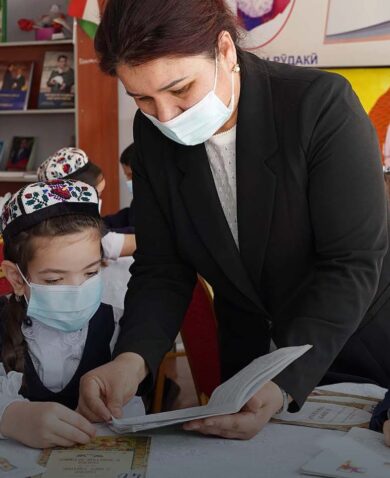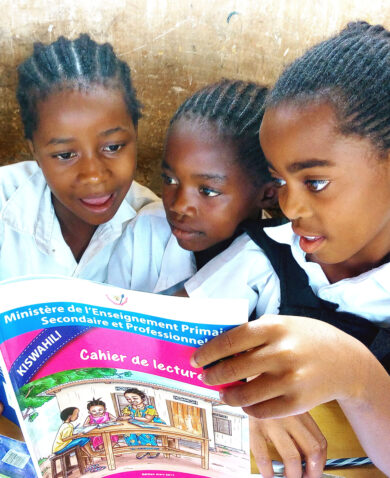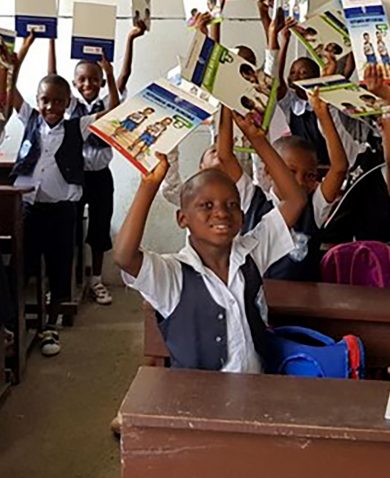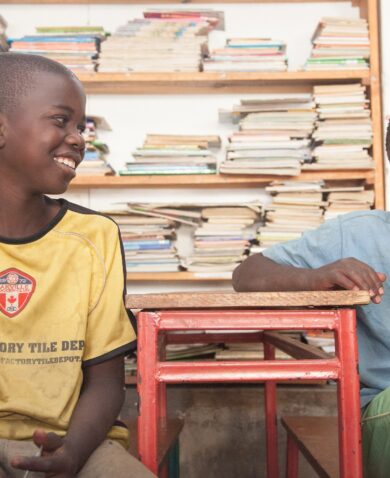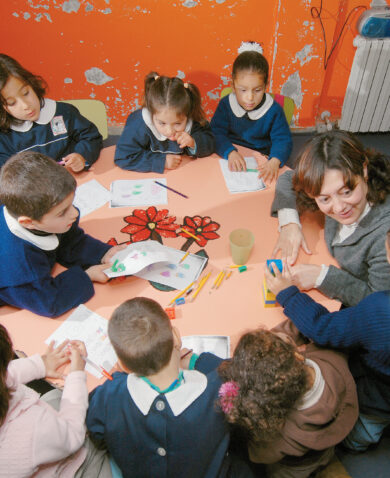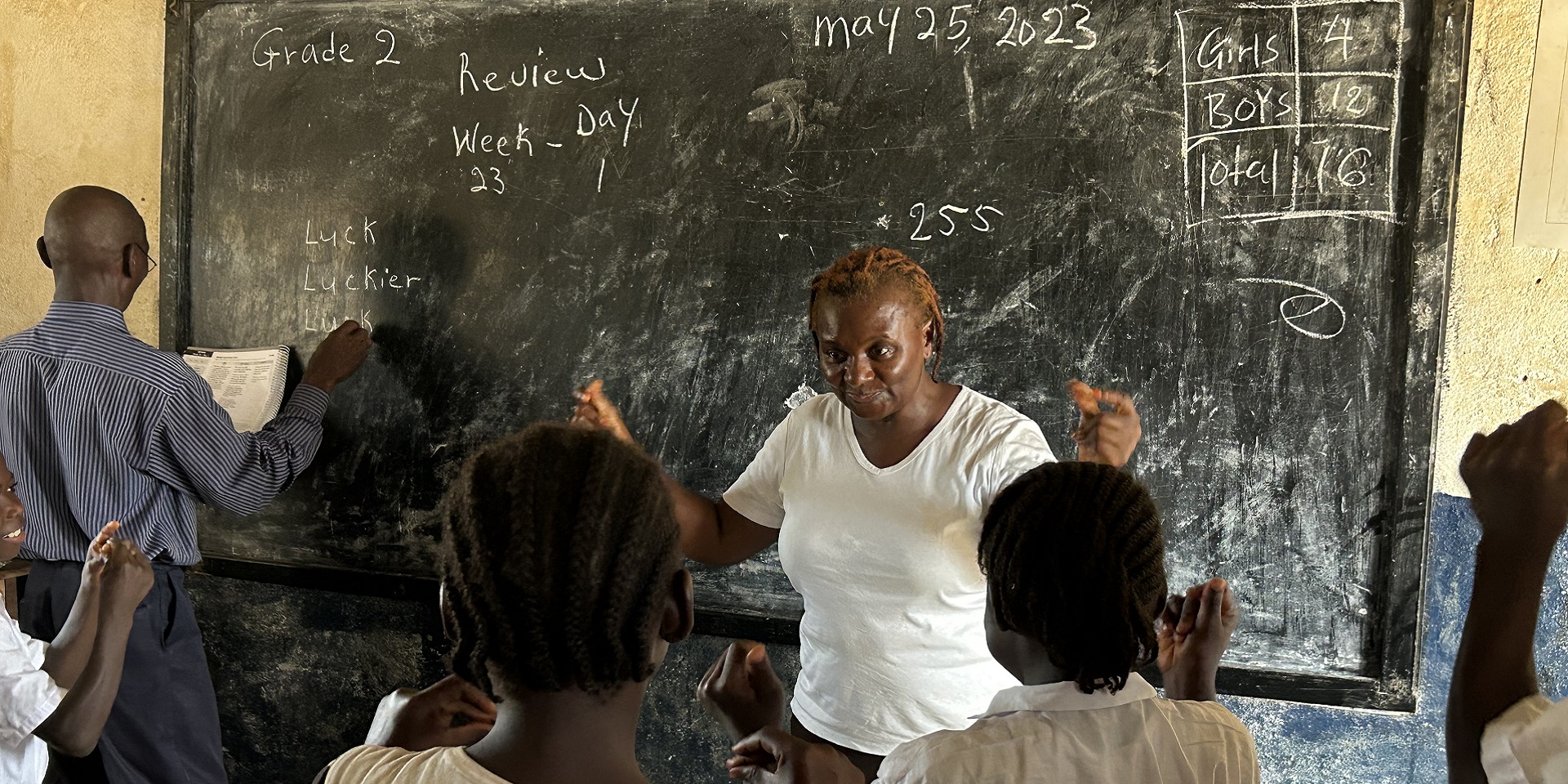
Unlocking the Power of “Super Levers” for Sustained Instructional Reform
September 15, 2023 | 5 Minute ReadLessons from our collaboration with local and international educational experts on best practices for foundational literacy in Liberia.
Why do certain educational reforms endure and flourish while others fade away, or only take root in specific schools or with certain teachers? What does it truly require to maintain new teaching practices at large scale over the long haul?
In a concerted effort to answer these questions, earlier this year Chemonics spearheaded a collaboration between a group of Liberian and international education experts, researchers, and behavioral scientists to design and conduct a targeted study of teacher uptake of new instructional practices for foundational literacy in Liberia. While significant investment has been made in the Liberia education system over the past two decades, the country is still not seeing adequate reading results at the primary level. Based on our experience, and evidence from other countries, we believe teachers can be the key driver to achieve better results, which compelled us to conduct this study and workshop.
Experts from Chemonics, Mathematica, and One World Network of Schools (OWNOS) collaborated in the design and preparations for the study. Harnessing the insights of Liberian and international educators and lessons learned from past USAID programming in Liberia, the study and subsequent workshop identified potent “super levers” – key assets from important recent efforts to boost reading outcomes in Liberia and additional pathways needed to make these “stick.”
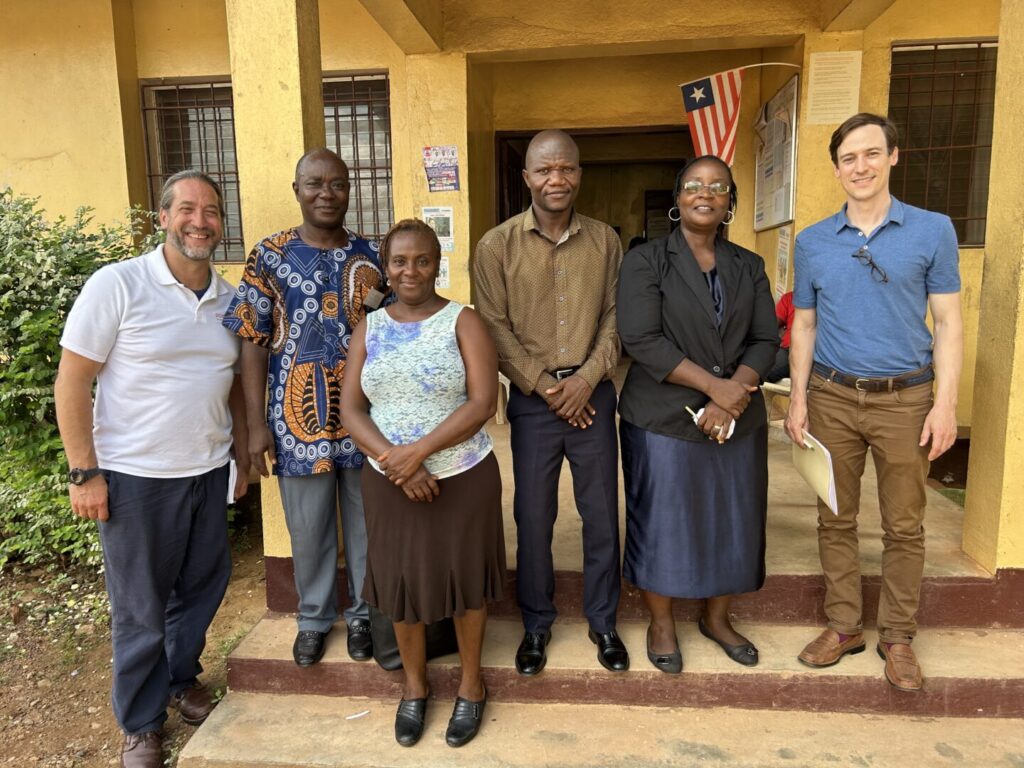
We used the Actor-based Change (ABC) Framework (Koleros, 2020) to design a qualitative methodology to help us better understand the drivers of behavior change and political economy factors within the education system in Liberia. Building upon the well-established behavior change wheel, also known as the COM-B framework (Michie, 2011), our approach centered on the fundamental premise that pivotal actors within the education ecosystem require the necessary capability, opportunity, and motivation to adopt and sustain behaviors needed to improve education outcomes and maintain these gains at scale.
In May 2023, the ground research team examined our hypotheses in Montserrado, Margibi, Bong, and Nimba counties, interviewing 15 district education officers and vice principals of instruction, and conducting focus group discussions with 28 teachers and direct observation of 13 classrooms teaching reading. This research and the accompanying actor-based workshop to further analyze findings shed light on the existing assets to harness and obstacles to overcome. Most importantly, the study and workshop revealed three pivotal “super levers” to improve the sustained adoption of effective teaching practices. Below we present these transformative levers alongside some of the insights we gained along the way.
Super Lever 1: Improve teacher capability through localized continuous professional development (CPD) with ample practice with targeted feedback
CPD is an important component of any instructional reform, but how this CPD is conducted – the specific content and adult learning techniques, as well as the modalities – can make all the difference. Localized CPD focused on bite-sized, high-value instructional techniques and routines that build “muscle memory” combined with providing teachers and coaches the ability and space to see and analyze examples of effective teaching using these techniques can amplify the impact on teacher capability (Bambrick-Santoyo, 2019).
In our study we observed teachers reverting to teaching strategies such as ineffective choral reading and rote recitation in Liberian classrooms that was not part of direct instruction introducing new skills. Students had memorized the words – or the sounds of the words – in the story, and as a result, when the teacher asked basic comprehension questions, the students struggled to answer, and it was doubtful that they would be able to read new text on their own. While training and coaching are known drivers of teacher success, these appeared underutilized. Nearly every education system actor we met said that they appreciated and wanted more training and coaching, including the coaches (principals and vice principals of instruction) themselves. Regularly providing such support is one challenge, but equally important is what happens during training and coaching.
With this in mind, we included an interactive session in our workshop modeling examples of highest-leverage actions (Bambrick-Santoyo, 2016; McCray et al, 2017) that teachers can use in the classroom, including simple but effective universal design for learning (UDL) techniques such as wait time to encourage all learners to respond. We asked workshop attendees to participate as demonstration coaches, teachers, and students. Our improvised actors and skits garnered many laughs, but also fully engaged the room. Ministry leaders and teachers alike saw the impact of what localized CPD focused on high-leverage practices can do to help teachers master simple and effective routines, and ultimately increase student reading results. Using these approaches on the USAID/Tajikistan Read with Me program, for instance, Chemonics measurably improved teacher practice and UDL practices, leading to student reading gains of eight correct words per minute in Grades 2 and 4.
Super Lever 2: Improve teacher opportunity to implement new practices through an enabling environment that allows them to apply new skills
Capability alone is not enough; Liberian teachers and their coaches need a more supportive enabling environment, including user-friendly and structured teaching materials fully aligned with student textbooks for every lesson and review session, more time to practice new teaching and coaching techniques and routines, and a culture around shared expectations and practices to sustain excellent instruction. In addition to the supporting materials, other potential solutions to help address these challenges include adjusting school timetables to increase time for reading instruction, and introducing multi-purpose reading camps – as we have done on the USAID/Tajikistan Read With Me and USAID/Rwanda Soma Umenye programs – or remedial sessions that provide teachers more chances to apply their new skills and coaches with the opportunity to practice coaching teachers with feedback.
Super Lever 3: Improve teacher motivation through progress-driven inspiration, support, and recognition to motivate and sustain teaching excellence
Although low salaries and delayed payment are a constant burden, Liberian teachers’ passion for their job far outweighs this challenge. This is evidenced by the fact that Liberia relies on many volunteer teachers who are not on the government payroll, but see it as an opportunity to build skills as they consider career options. Teachers cited numerous other sources of motivation such as seeing the progress of their students, feeling supported by their supervisor and school, receiving ongoing training and coaching to continue learning themselves, opportunities for career growth, having sufficient avenues for sharing lessons learned, and recognition and appreciation. Simple printed training certificates are so highly valued that we observed teachers carrying them every day. To address these motivators, the government and development partners should ensure that coaching is provided regularly and systematically, introduce and expand teacher well-being support and continuous encouragement, and expand accreditation and other incentives to spur teaching excellence.
Leveraging These Super Levers
While some of these levers are tailored to the unique Liberian context, we believe many other countries grappling with similar challenges regarding teacher performance can effectively leverage most of them to help maintain reform gains. In addition, given the growing importance of behavior-driven approaches in international development, the ABC Framework can be useful to analyze both the individual and systemic aspects of behavior change in any new context. In our case, Liberian partners and ministry staff left the workshop eager to pursue how to apply the super levers into action for achieving and sustaining foundational learning reform in Liberia.
Jennifer Swift Morgan, Audrey Spencer, and Sarah Hopewell from Chemonics, Emilie Bagby and Kristine Bos from Mathematica, and Liberian colleagues Massa Crayton and David Baysah contributed to this study and article.
Banner image caption: One of the researchers, Patience Suah, speaks to children in Liberia. The photo was taken by Chemonics.
Posts on the blog represent the views of the authors and do not necessarily represent the views of Chemonics.









